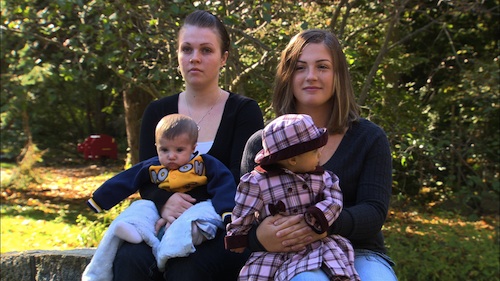
KRISTEN GRIECO ELWORTHY – PRODUCER
In the summer of 2008, the high school principal of the fishing town of Gloucester, Massachusetts told a TIME Magazine reporter that 18 girls at his school had made a pact to become pregnant. The scandal shocked the world, breaking in the days before teen moms graced the cover of US Weekly by virtue of MTV reality shows like “16 and Pregnant.” Reporters from Europe, South America, and most of the United States flocked to Gloucester. Each outlet hoped for the big “get”—a Gloucester girl, obviously pregnant or cradling a newborn, that could provide evidence of this so-called pact.
The pregnancy pact accusations came from trusted sources. The longtime high school principal, a man that the students and parents depended for his tough-love stance with his pupils, was allegedly the one to label the situation a pact. The superintendent of schools at first confirmed the principal’s report, later backing away and denying it. As the story spun, the truth seemed more ephemeral and difficult to grasp. Officials’ statements contradicted one another as they piled up, and random reports from strangers stopped in the streets, mugging for their 15 minutes of fame, add to the confusion while the girls remained elusive.

Interested in “The Gloucester 18”? Watch it on Prescreen
This wasn’t a story that could be told in a two-minute segment on the nightly news, or one that could be unraveled quickly enough to create an honest or factual sound bite. I knew it was far more complicated than that, because I was the reporter at the local paper who covered the story when it had been something far less incendiary: an alarming spike in the number of teen pregnancies at the school, and a principal who noted that many of the girls were part of the same clique.
As the news coverage reached fever pitch, the town began to withdraw. Always a protective and insular community, Gloucester didn’t take kindly to the kinds of characterizations loosely bantered about, or to the strangers coming in and judging their daughters or calling them names. (Gloucester also didn’t take kindly to the daughters themselves; that same summer many young moms, teens or not, reported receiving glares in grocery stores or at ice cream stands as residents silently communicated that they were at fault for all of this.)
The true story never came out. The girls were never given a voice. Having left my job at the paper a few months before the story became a national one, I was no longer involved in its day to day reporting. But watching from afar, I knew something was wrong. Gloucester is a complicated place with unique challenges culturally and socio-economically. I was certain that what happened was far more complex than the flat and simplistic “pact” explanation. Eighteen pregnancies had occurred in one year—four times what the city had seen in any year previous. After a few weeks, reporters finished the witch hunt, abandoned any search for truth, and packed up their cameras.
Along with a team consisting of director John Michael Williams and associate producer Joseph Provenzano, I went to work digging up the truth of what happened in Gloucester. Whether the answers would salvage the city’s reputation or further denigrate it, we all felt the same curiosity as the rest of the world. Our proximity and local knowledge gave us the resources to do what no other film team sniffing around at the time could do: we found the girls, developed relationships with them, and captured their story in a documentary film.
We’re often asked how we were able to get the girls’ stories when so many media outlets with a plethora of resources were unable to. First, we had the advantage of spending time with the story. Secondly, living locally, we found ourselves in Gloucester on a daily basis, pounding the pavement, asking questions, and eventually turning up the girls who were a part of this pregnancy pact story. We got to know them, and then we turned the cameras on to record them for the world. We were determined to give them a voice, knowing they had been described, labeled, maligned and judged both by trusted adults like their school principal, and by people who had no knowledge of them or their situation.

We uncovered the only firsthand, true account of the Gloucester pregnancy pact that had captivated the world’s attention. How, we wondered, would we not get distribution quickly? Of course, the start of filming in 2008 coincided with a seismic shift going on across the country: the economy was tanking, and with it, the indie distribution model was in upheaval.
Still, we had early interest from a number of distributors. When we started screening the film in Boston, we had standing-room-only audiences. Publicity picked up. We were even the topic on “The O’Reilly Factor” one night. The press we were getting was maddening, considering the fact we had no way to sell the film, but we took advantage of the media interest in the film. We hoped that by building an audience for the film, we’d attract the interest of distributors or maybe even be able to self-distribute.

As our talks with various distributors have continued and time has passed, we have begun to think about filming updates on each of the girls we interview in the original film. People are constantly asking us what’s happened to them, and beyond the natural curiosity that one has when you get to know a character in a documentary, we discovered that their lives had progressed in interesting ways. Nearly all of them had had two or more children (a rate much higher than the national average of 25%). We wondered if examining what happened to them over time would lend even more insight into that mysterious pregnancy spike in 2008.
Beyond that, the way that the Gloucester girls, arguably the first “famous” pregnant teens in this country, handled their parenting experiences could give the same insight to viewers about teen parenting that “The Gloucester 18,” a story about why and how they’d gotten pregnant, had given about teen pregnancy. We became increasingly excited about filming the girls again, and had encouragement from some of the distributors we were talking to.
I read about Prescreen in a Wall Street Journal article in September. I was intrigued by the fact that the company had been launched by a Groupon executive, which meant he’d be excellent at building a list—and potential audience. I also liked that they weren’t looking to take any rights from us. The team discussed Prescreen, and while it was in very early stages with a small list and lower numbers, we saw it as a testing ground to see whether people truly remembered the Gloucester pregnancy pact story, and/or if they were interested in hearing what had really happened.
We weren’t really looking for a revenue generator, we were looking for fertile ground for an experiment, and that’s what we got with Prescreen.
“The Gloucester 18” is currently one of the most successful films on Prescreen. It was the first movie to break 100 on the platform. We believe there were a couple of elements to our relative success on the platform.
The Topic: Our gut feeling that the film would do well on Prescreen was supported by the reaction that we get whenever we mention the project in a social setting or to a media contact or blogger. “The Gloucester 18” is a lightning rod to bring up at a cocktail party, even today. We thought that if people remembered the story, they’d likely be interested in paying $4 or even $8 to find out what had actually happened.
Our Marketing Efforts: We have had a couple of years to work on the film and in that time, have developed relationships with teen pregnancy organizations like The National Campaign and Planned Parenthood. We also have screened the film at events and have developed a following that way. Our Facebook page has around 500 fans and is a good way of getting the word out about the film. We activated our teen pregnancy networks, who tweeted about the film and put it into their weekly e-newsletters. Educators and those active in the teen pregnancy world are often interested in the film. We also did media outreach. We promoted stories in the local Boston press about our film being the first local film to premiere on Prescreen, etc. We also talked to bloggers who covered MTV’s teen parenting series, many of whom were interested in tying “The Gloucester 18” to their coverage. While Prescreen has a marketing list via email, we felt it important to market the film ourselves as well, and we believe that helped lead to a successful debut.
We wouldn’t have necessarily predicted it a couple of years ago, but the stories of the girls continue to fascinate, intrigue, and raise questions, so we’re following our gut instinct and putting the cameras on them again. We believe the film’s sequel will allow us to answer the audience questions we always get: how did these girls fare? Did being a part of The Gloucester 18 affect their lives forever? And what can we learn about this group of girls to help us talk with our kids about sex and teen pregnancy?
ABOUT THE AUTHOR:
Kristen Grieco Elworthy is the producer of “The Gloucester 18.” Once a reporter for the Gloucester Daily Times, she first broke the news of something strange going on with the Gloucester High teen pregnancy rate in March 2008, when only 10 girls were pregnant and rumors were surfacing of a clique becoming pregnant on purpose. Kristen also produced the documentary film “Bridgend,” about a teen suicide contagion in Southern Wales, with the team from “The Gloucester 18.” She is originally from the Boston area and has an M.S. in Journalism from Boston University.
























